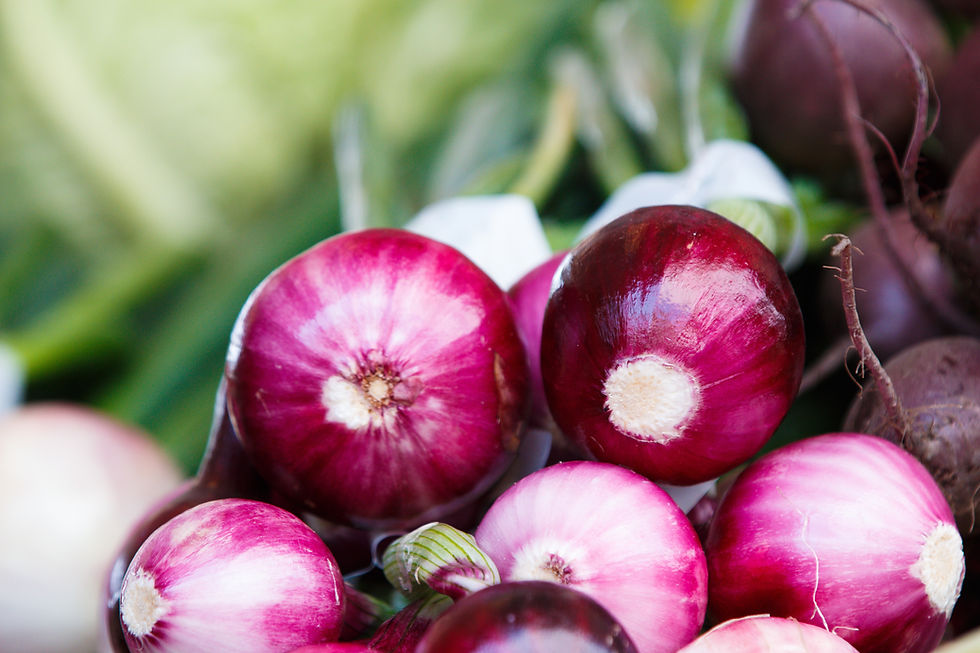Summertime Salad
- Dr. Amy Knaperek, PharmD

- Jun 20, 2022
- 4 min read
Updated: Jun 21, 2022

Summer is here and the temperatures are rising (at least here in the Northern Hemisphere). When it is hot and sticky, sometimes you just don’t’ feel like having something hot for lunch or dinner. How about a salad? Leafy green salads are tasty, but sometimes it is nice to have a different kind of salad.
I found this refreshing Chickpea salad recipe at Chickpea Salad Recipe - Vegan and Oil Free - Know Your Produce. It is really simple and full of vegetable-based protein and rainbow of veggies (well, technically, most of these are “fruits”).

Now let’s talk about the health benefits of the ingredients.

Chickpeas:
Also known as garbanzo beans, chickpeas are from the Middle East and are full of healthy vitamins, minerals, and fiber! They are also a great source of plant-based protein. The micronutrient content includes manganese, folate, copper, iron, zinc, phosphorus, magnesium, thiamine, pyridoxine (vitamin B6), selenium, and potassium. The protein and fiber may help you feel full at meals and help with appetite control. The high fiber content also helps feed the microbiome, which encourages the growth of good microbes and limits the unhealthy ones.
Eating chickpeas and other legumes may reduce the risk of certain chronic diseases. Magnesium and potassium are beneficial for heart health and may prevent high blood pressure. The soluble fiber in chickpeas may also lower LDL cholesterol. Need help regulating your blood sugars? The fiber and protein in chickpeas can help with that. Chickpeas are a low glycemic index food, which means they don’t lead to large blood sugar spikes after eating. Chickpeas are also a good source of magnesium which is essential for nerve function and muscle movement.

Cucumber:
Water is essential for life. If you have trouble drinking enough water every day, remember that some foods can provide quite a bit of water, too. Cucumbers are full of water (about 96%), vitamins, and minerals. Some of the micronutrients include vitamin K, potassium, vitamin C, manganese, and magnesium, but remember that most of these are in the skin. It is best to eat cucumbers unpeeled whenever possible to get the most amount of nutrients. Try to grow your own or get them from a local farmer’s market. Remember, vitamin C starts to degrade as soon as a vegetable is picked, so finding a local source for your vegetables is best!
Cucumbers contain antioxidants and flavonoids, which help to protect our cells from oxidation and free radicals. Free radicals are atoms with unpaired electrons looking to steal electrons from other atoms. They can be very damaging to our cells and have been associated with cancer, heart disease, autoimmune diseases, and respiratory diseases.

Tomato:
Tomatoes, native to South America, are a fruit in the nightshade family. Some people are sensitive to nightshades (tomatoes, eggplants, potatoes, peppers), which can cause damage to their intestinal lining and systemic inflammation. It is recommended to have a food-sensitivity test done to see if nightshades trigger an immune response in your body. Luckily, nightshades do not cause this reaction in everyone, because they are full of vitamins and minerals.
They are a major source of lycopene, which can reduce the risk of heart disease and cancer. However, tomatoes need to be cooked for the full benefits of lycopene. They are also a good source of vitamin C, potassium, folate and vitamin K, and fiber.

Red Pepper:
This is another member of the nightshade family from Central and South America. They are an excellent source of vitamin C! They also contain vitamin B6, copper, vitamin K, and manganese. Vitamin C is a powerful antioxidant, which may reduce the risk of cancer and heart disease. Vitamin B6 is essential for protein metabolism, cognitive and immune function, and has been used to prevent nausea in pregnancy. Copper has anti-inflammatory properties that may help reduce pain and swelling associated with arthritis.

Red Onion:
Onions have many health benefits. They contain an antioxidant called quercetin, which has anti-inflammatory properties and helps to boost the immune system. Onions may also have antibacterial functions to support the immune system. Onions contain a substance called fructooligosaccharides, which are prebiotics that feed the good bacteria and promote good gut health. Other micronutrients in onions include manganese, vitamin B6, vitamin C, biotin, and copper.

Lemon Juice:
Lemon juice is a great source of vitamin C, of course! Vitamin C is a powerful antioxidant and helps to boost the immune system. It also contains polyphenols, which have anti-aging properties and improve skin and hair health. Lemons also have potassium, calcium, and folate.

Parsley:
Native to the Mediterranean, parsley has two main cultivars: French curly-leaf and Italian flat-leaf. Parsley is more than a garnish, though! It is an excellent source of vitamin A, vitamin K, and vitamin C. It also contains folate and potassium. Vitamin K is essential for blood clotting and bone health. Parsley is rich in antioxidants including flavonoids, carotenoids, and vitamin C. Lutein, beta carotene, and zeaxanthin are three carotenoids found in parsley that have amazing benefits for your eye health.
Just like soups, salads are an excellent way to add more vegetables into your diet. This salad seems to have the complete package with lots of veggies and good plant proteins and fiber to keep you full and satisfied. Feel free to experiment and add different vegetables from the rainbow and change up the flavor profile!
Are you ready to PIVOT to functional health and wellness?
Images: Chickpea Salad Recipe - Vegan and Oil Free - Know Your Produce; Abel & Cole (abelandcole.co.uk); Top Health Benefits of Parsley! – Juice Nashville









Comments